Learning Inclusivity in a Salad Bowl Society
留学前に経験した不安と葛藤 Overcoming Uncertainties Before the Study Abroad
私は生まれた時から東アジアのいくつもの国に住んで、文化的に混ざり合った環境で育ったにもかかわらず、どうしても「多文化社会」の概念について理解が追いつかず、常に興味があったトピックでした。そのため、交換留学の募集が始まった際、私は真っ先に留学先を北米としました。私は実際に留学する前までは北米、特にカナダは革新的でリベラルな価値観、自由、権利と平等性を非常に強く大事にし、包摂的な「メルティングポット」に成功した国だと思っていました。そして、それらの価値観に魅了され、日本が持てたらどれだけ良いかと思い、カナダのマギル大学を出願しました。
しかし、留学を決めるまでの間、葛藤に見舞われたこともありました。留学を行うのは私が3年生になる年であるため、勉強が一年遅れてしまうことへの不安が大きかったです。3年生のSPSFとFGSゼミ、同級生が行い始めていたインターンシップや就活、課外活動を同期よりも早く辞め引退しないといけないこと。これらを諦められるかということに悩みながら何ヶ月か過ごしました。ですが、上智大学では多くの先生方の励まし、帰国後の残りの学年についての相談などに乗ってくださった総合グローバル学部のスタッフ、支えてくれた家族のおかげで私は背中を大きく押してもらい、留学に行くことを決意しました。
Growing up in several East Asian countries gave me a culturally mixed environment to grow up in. But I never truly believed I understood the concept of what a multicultural society looked like, perhaps because I grew up in a homogenous society as a majority my whole life.
So when the applications began for the exchange program, I immediately chose North America as the destination to study abroad. I had a whole pre-established image of North America, especially Canada, as the figurehead of a successful inclusive “melting pot”, with progressive liberal values, their strong appreciation for freedom, rights, and equality. It was what I wanted Japan to have in the future which is what made Canada extremely alluring to me.
Yet, before applying, I had a period of uncertainty since my study abroad would be in my 3rd year at Sophia. This meant I had to inevitably delay my studies by a year as I would not be able to attend the 3rd year SPSF and FGS seminars, conduct internships in Japan, while finishing my extracurricular activities at Sophia earlier than others. However, the reassurance and encouragement from many Sophia professors, and the support from the Faculty of Global Studies staff through their consultation with me on how I can plan my academic year once I return to Japan made me confident in my decision to study abroad.
渡航中現地で得たもの Experience During Study Abroad
カナダに着いてすぐ、自分が持っていたカナダのイメージが間違っているわけではありませんでが、完全に正しいわけでもないことに気づきました。カナダはどちらかというと「メルティングポット」というよりかは「サラダボウル」に近い国でした。もちろん私がいたモントリオールでは大きくフランス人社会でしたが、それでもそれぞれのマイノリティーグループが自分達の民族性、宗教、文化的背景に対するプライド、マイノリティーではないフランス人からの敬意を持つことにより、一つの「カナダ人」というアイデンティティーが作られているのを感じました。このような「みんな違ってみんな良い」という考えはカナダだからこそ感じることができ、「これが多様文化社会なのだな」と思うことができました。予想通り、特に社会生活において、カナダは革新的でリベラルな社会でした。McGillに来てから1ヶ月も経たないうちに私は3つ異なる抗議運動を目の当たりにすることができました:「The National Day for Truth and Reconciliation/Orange Shirt Day (No Pride in Genocide 運動)」、「The Climate Strike for Climate Week」(気候運動)、イラン人女性の服装規定反対のための反イラン運動。マギルの友人達が積極的に参加し、色とりどりの横断幕を掲げて行進しながら、彼らが信じる正義のために声を上げていました。日本では学生が率いる抗議活動が少なかったため、最初は驚きました。ですが、彼らをみていることで私自身もClimate Strike に参加し、自身が信じるもののために戦うという自信が付きました。
Upon arriving, I quickly realized that while my pre-established image of Canada was not entirely wrong, it was not entirely correct either. Canada was, rather than a “melting pot”, closer to what is known as a “salad bowl”. While there was a loose sense of a unified national identity, largely from the majority population, the whole concept of Canada’s identity circulated around the idea of multiculturalism, and the celebratory appreciation towards one’s own ethnic, religious, and cultural backgrounds.
This was shown through most prominently in their societal life. Within the first month at McGill, I had already witnessed 3 protests: The National Day for Truth and Reconciliation/Orange Shirt Day (No Pride in Genocide Movement), the Climate Strike for Climate Week, and the Iranian protest movement. I was amazed to see real-life protests with my friends from McGill actively participating, marching down the street with colorful banners, and raising awareness for what they believed in. It felt surreal for me as someone who in Japan had never seen so many students from their university protesting in public streets with other local actors.
留学の中で最も価値があったものはおそらく現地の(マギル)学生だと思います。特にクラス会議などでは、ウクライナ戦争について、カナダ・カナダ人には何ができるか、米国の行動をどのように捉えているか、この先グローバル社会はどう進んでいくか、カナダ自身の多文化主義政策への評価と批判、特に First Nations の扱いについての批判的な意見を表明し、意見を述べていました。私にとって、この体験が留学生活で一番貴重でした。現在の政治的および社会的問題について、同世代の意見を明確に聞くのが初めてだったからです。上智と日本にいる間、専門家、記事、メディアのインタビューから世界的な問題や意見を聞きましたが、カナダでは、上智のクラスで取り上げた問題について、一般の人や活動家から直接話を聞くのが初めてだったからです。マギルの多くの学生は強い意見を持っていますが、様々な視点や考えがあることを理解して受け入れてくれるため、私も会議に積極的に参加し、自分の考えを発すことができ、国際関係や多文化主義に関する新しいトピックや視点について学ぶことができました。これらの交流は、自分の関心分野がどこにあるのかを理解し、卒業論文のトピックを開発するのにさらに役立つことに繋がりました。
The university students were perhaps the most influential in making my study abroad experience extremely valuable. Many of them were opinionated, especially during class conferences, voicing thoughts on the Ukrainian War, what Canada should do, concerns for the US, the future of the world order, and critical remarks on Canada’s own multiculturalism policies, especially on the treatment of First Nations Indigenous communities.
To me these conferences were important as it was the first time I clearly heard opinions from my generation on current political and social issues. While at Sophia and Japan, I did hear worldwide issues and opinions from experts, articles, and media interviews, it was in Canada that I heard the public and individual actors, speak of the issues I covered in class back at Sophia, so clearly and openly. And though many students did have strong opinions, they were equally aware and understanding that there were multiple viewpoints and ideas on a key issue, allowing me to openly participate in the conferences and discuss my own perspectives. These interactions ultimately allowed me to learn new topics and opinions about international relations and multiculturalism. In addition, further helped me realize where my field of interests lay, and develop my topic for the senior thesis.
My Reflections and Future Hopes
カナダに留学したことで、多文化主義と「Inclusivity」に関する研究、特にサラダ社会がどのように機能するか、様々なコミュニティグループがお互いをどのように受け入れ、力付けるかというアプローチを学ぶことができました。抗議行動やストライキを直接目の当たりにすることにより、国際関係の問題に対する見方も大きく変わりました。デモを直接目撃すること、メディアや報道機関で抗議を目撃することの間には明確な違いがあるということを認識できました。多様文化生の中マイノリティとして浮き彫りにする社会に身を投じることで、この留学経験を基に東アジアでカナダのようなインクルーシブな環境を作りたいという私の目標に繋がりました。日本は依然として差別、分離主義、排他性の問題に対処する必要性に直面しているため、私の経験から、日本でもそのような交流のためのプラットフォームを将来提供できるために繋がることを信じています。
Studying abroad in Canada allowed me to recognize my interests in international relations to multiculturalism and inclusivity studies, especially on how salad societies work, particularly in their approach of accepting and empowering different community groups. Witnessing protests and strikes in person significantly changed my perspectives on international relations issues. I was able to recognize that there were clear differences between witnessing protests in person versus just on media and news outlets.
By immersing myself in such a society that accepts the opportunity for inclusive discussions and highlighting/empowering minority groups, this study abroad experience connected to my goal of wanting to create a similar inclusive environment in East Asia. As Japanese society still needs to address issues of discrimination, separatism, and exclusivity, I believe through my experience I am able to work towards providing such a platform for interactions in Japan as well.
留学を考えているFGS生さんへ Message to FGS Students
私にとって留学生活は自分の人生をゼロからスタートできる非常にやりがいのある経験でした。ゼロから関係を築き、自分の国と留学先との違いに気づき、比較し、現地の人と共有できます。また、一人だからこそ自分と向き合いながら自分の強みやスキルを認識することができ、自分に自信がつきます。グローバルな社会問題、カナダと米国が果たす役割について深く学び、そのような社会問題をなくすために変化をもたらそうという意志を強く持つ学生と一緒に議論しながら解決策を行動へ変えることへと繋げることもできます。(また、世界中に友達を作る絶好のチャンスです!)
上智大学を1年休むことに不安を感じる方が多いと思いますが、この経験は戻ってきた時に必ず考えもしなかった新しい視点、ボーダーレスに人と繋がれる機会を作ってくれます。一生に一度の経験ですので、怖がらず挑戦してみてください!全力で応援しています!
To me, my study abroad was an extremely rewarding experience where you are able to start your life from zero completely on your own. You create relationships from scratch, notice, compare, and share differences from your home country to your new home country. You have time to reflect, recognize your own strengths and skills, learn in-depth about global affairs and the role Canada and the US plays, and hear students passionately discuss and take direct actions to address and resolve such issues. I promise that by the end everyone comes out much more confident and become active changemakers. (And it is an amazing opportunity to make friends from all parts of the world!)
I understand that missing a year at Sophia may feel uneasy and risk-taking but the experience will always make up for it and when you return you will definitely be more open to new perspectives and ideas you never would have even considered.
If you’re up for this once in a lifetime experience, don’t be afraid and just go for it!
Best of luck!
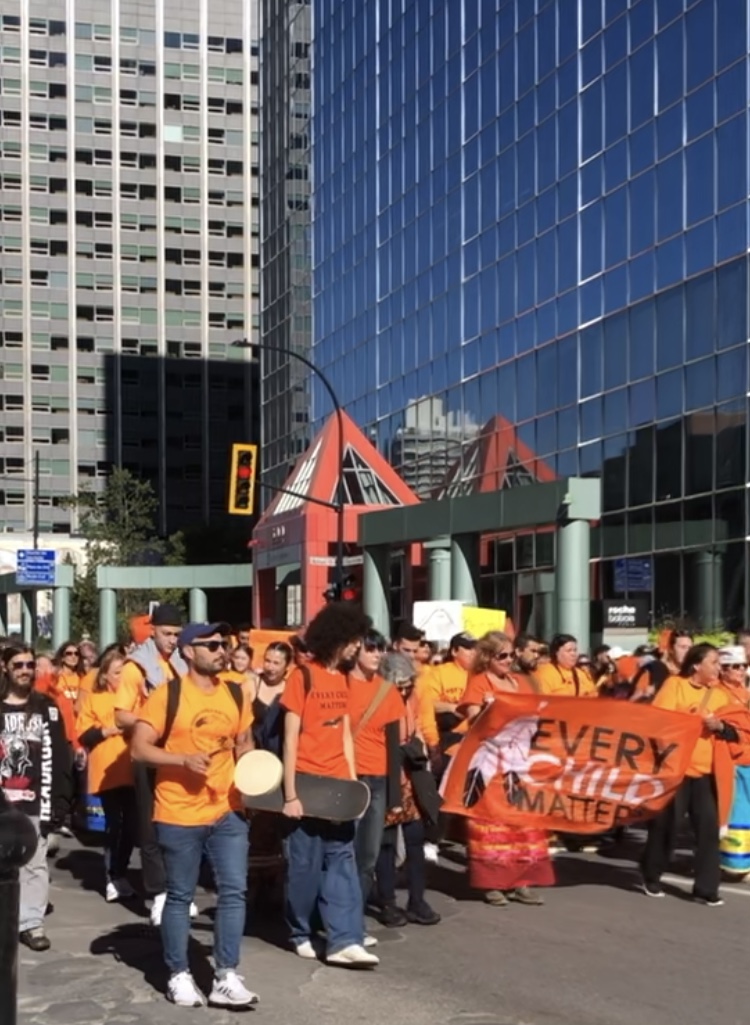
Orange Shirt Day (No Pride in Genocide) Protest March
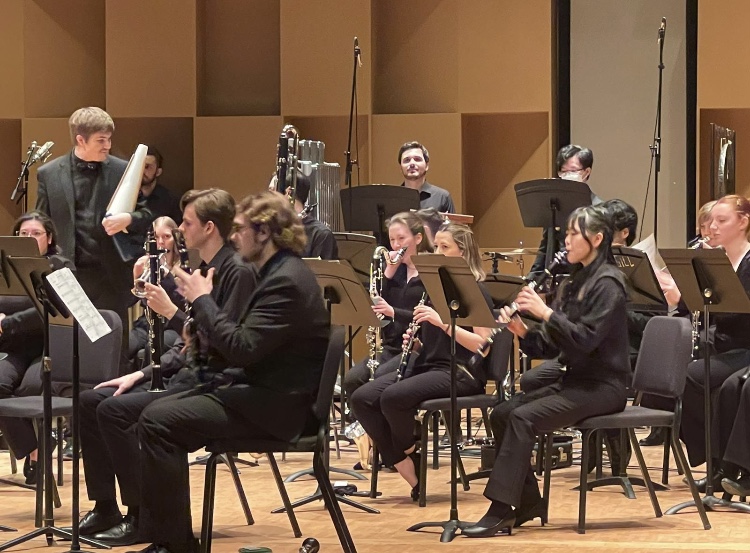
マギル音大(Schulich School of Music)の授業に参加 Playing with Music Major students in the McGill Wind Orchestra class
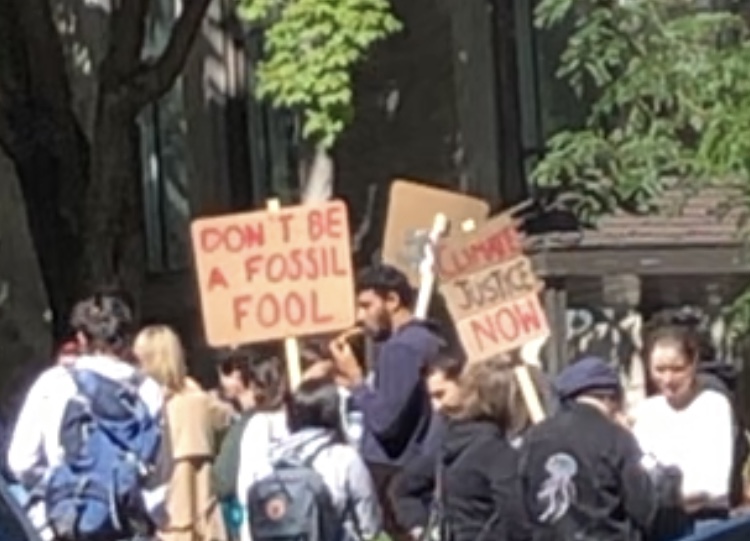
Climate Week中の気候マーチを行う様子 Climate Strike at McGill on Climate Week
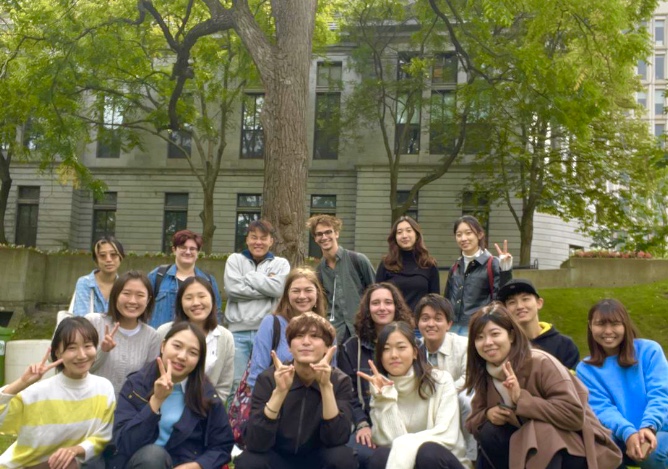
日本語、英語、フランス語の言語交換イベント Language Exchange for Japanese, English, and French between McGill and International Students
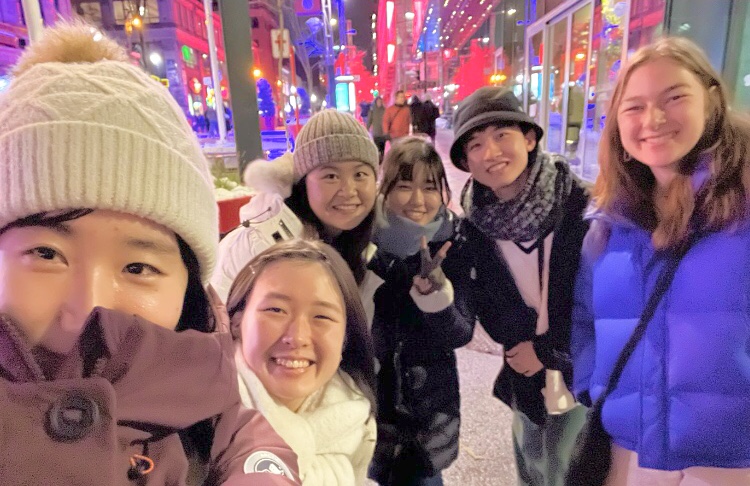
冬は留学生仲間と近くの無料アイススケートリンクでアイススケート Ice skating on the free ice skating rinks with friends
